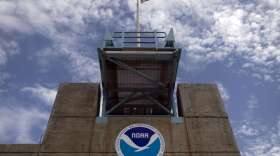-
(Runtime :56) On the banks of the Snake River in far eastern Washington, sockeye salmon have had a rough summer. The water behind the last major concrete…
-
PreviousNext(Runtime 4:12) PreviousNext(Runtime 4:04)PreviousNext(Runtime 4:14)PreviousNext(Runtime 4:05)PreviousNext(Runtime 3:59)
-
The Bell M. Shimada is designed to gather scientific information. But the collaborative effort of the crew and officers makes scientific endeavors at sea possible.
-
At least twice a year, a team of scientists on NOAA's research vessel Bell M. Shimada survey waters along the Washington and Oregon coast.
-
Fish swimming out to sea over the past year have lucked into some of the best water temperatures and food abundance along the West Coast in the last 24 years, according to an analysis from the National Oceanic and Atmospheric Administration began monitoring ocean conditions.
-
There's only been one other year – 2005 – that Greek names have been needed. The National Hurricane Center on Friday announced storms called Alpha and Beta have formed in the Atlantic.
-
David Legates, a professor whose research has been supported by fossil fuel companies, has been hired for a top position at the federal agency that oversees weather and climate forecasting.
-
July started off cool, which lowered wildfire risks in Washington and Oregon. But a new outlook shows excessive heat and a lack of precipitation have helped to dry out fuels in southern and central Oregon and central Washington. In those areas that have been dealing with drought, the land is ready to burn.
-
After years of fear and uncertainty, bottom trawler fishermen — those who use nets to scoop up rockfish, bocaccio, sole, Pacific Ocean perch and other deep-dwelling fish — are making a comeback here, reinventing themselves as a sustainable industry less than two decades after authorities closed huge stretches of the Pacific Ocean because of the species’ depletion.
-
It "was not based on science but on external factors including reputation and appearance, or simply put, political," the agency's acting chief scientist wrote.
Play Live Radio
Next Up:
0:00
0:00
Available On Air Stations










